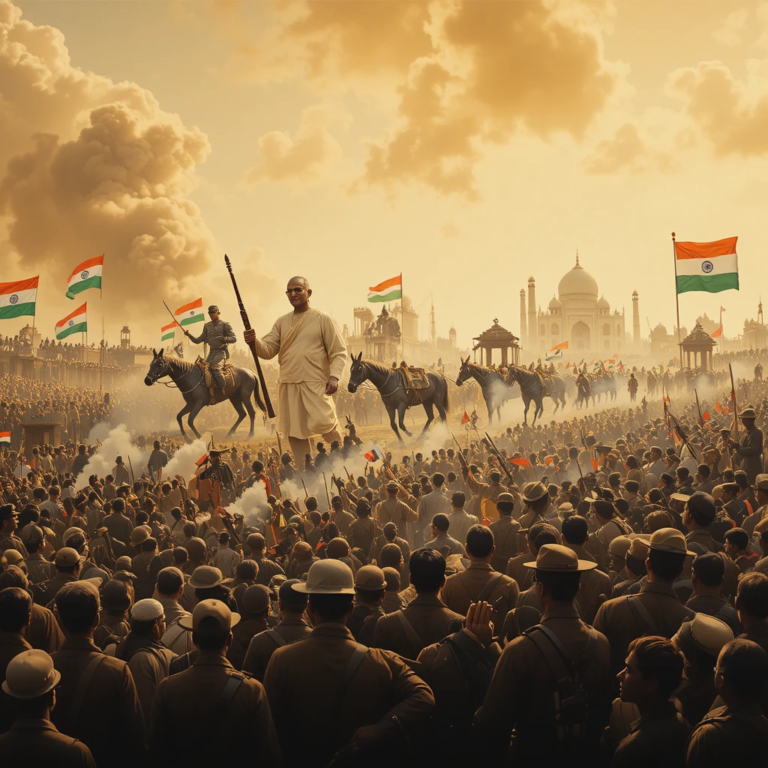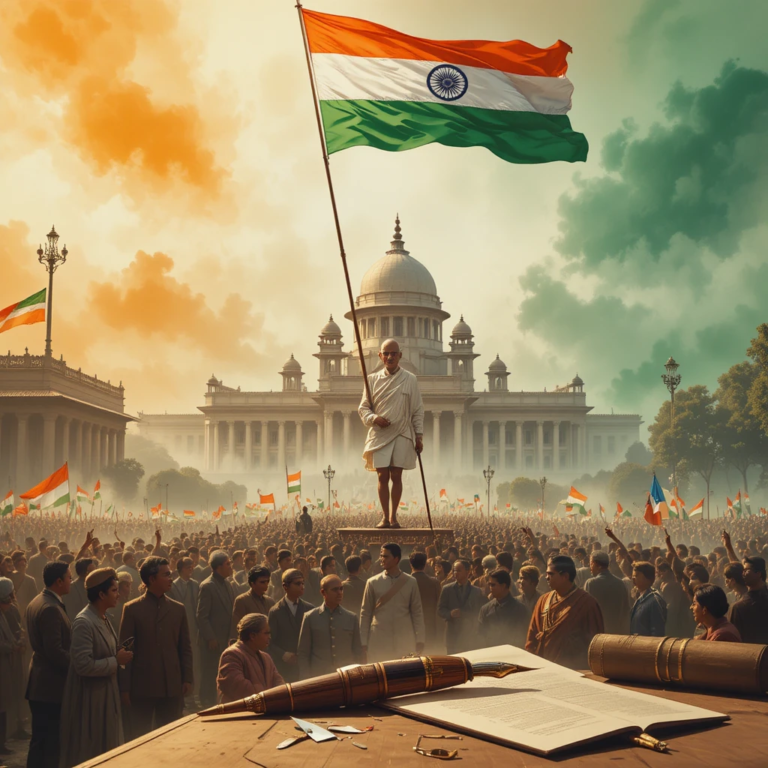Zohran Mamdani, a 33-year-old democratic socialist and New York State Assembly member, stunned the political establishment by winning the Democratic primary for New York City mayor. Defeating former Governor Andrew Cuomo, a seasoned political heavyweight, Mamdani’s victory marked a seismic shift in the city’s political landscape and signaled the growing influence of progressive politics in the United States. As the first Muslim, first South Asian, and youngest Democratic mayoral nominee in New York City’s history, Mamdani represents a new generation of leaders challenging systemic inequities through grassroots activism and bold policy proposals. This article explores Mamdani’s background, family heritage, political ideology, career trajectory, and potential future in American politics, offering a comprehensive portrait of a figure poised to reshape the national stage.
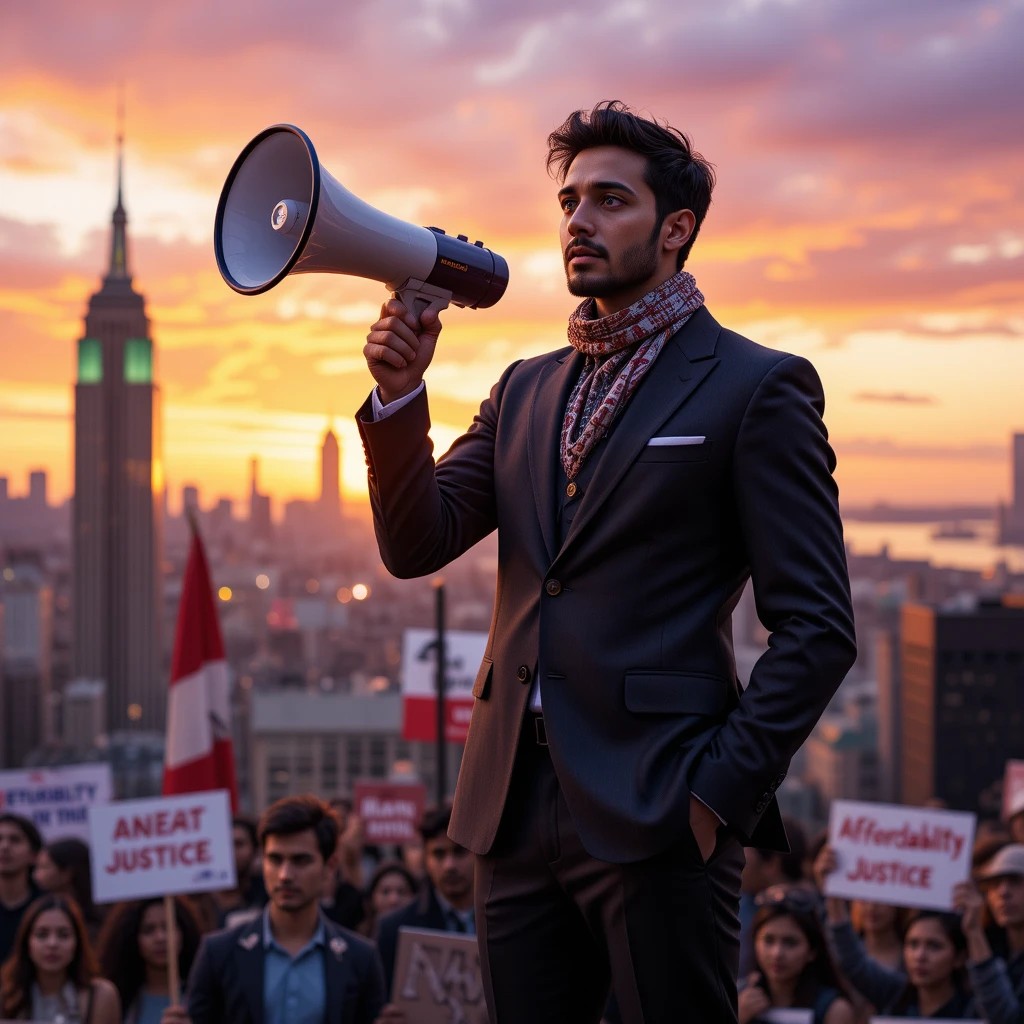
Table of Contents
Early Life and Family Heritage
A Multicultural Upbringing
Zohran Kwame Mamdani was born on October 18, 1991, in Kampala, Uganda, to parents of Indian descent who embodied intellectual and artistic excellence. His father, Mahmood Mamdani, is a renowned Indian-Ugandan academic and postcolonial studies scholar, while his mother, Mira Nair, is an acclaimed Indian-American filmmaker. Mamdani’s early years were shaped by a rich tapestry of cultures, geographies, and intellectual traditions, which profoundly influenced his worldview and political activism.
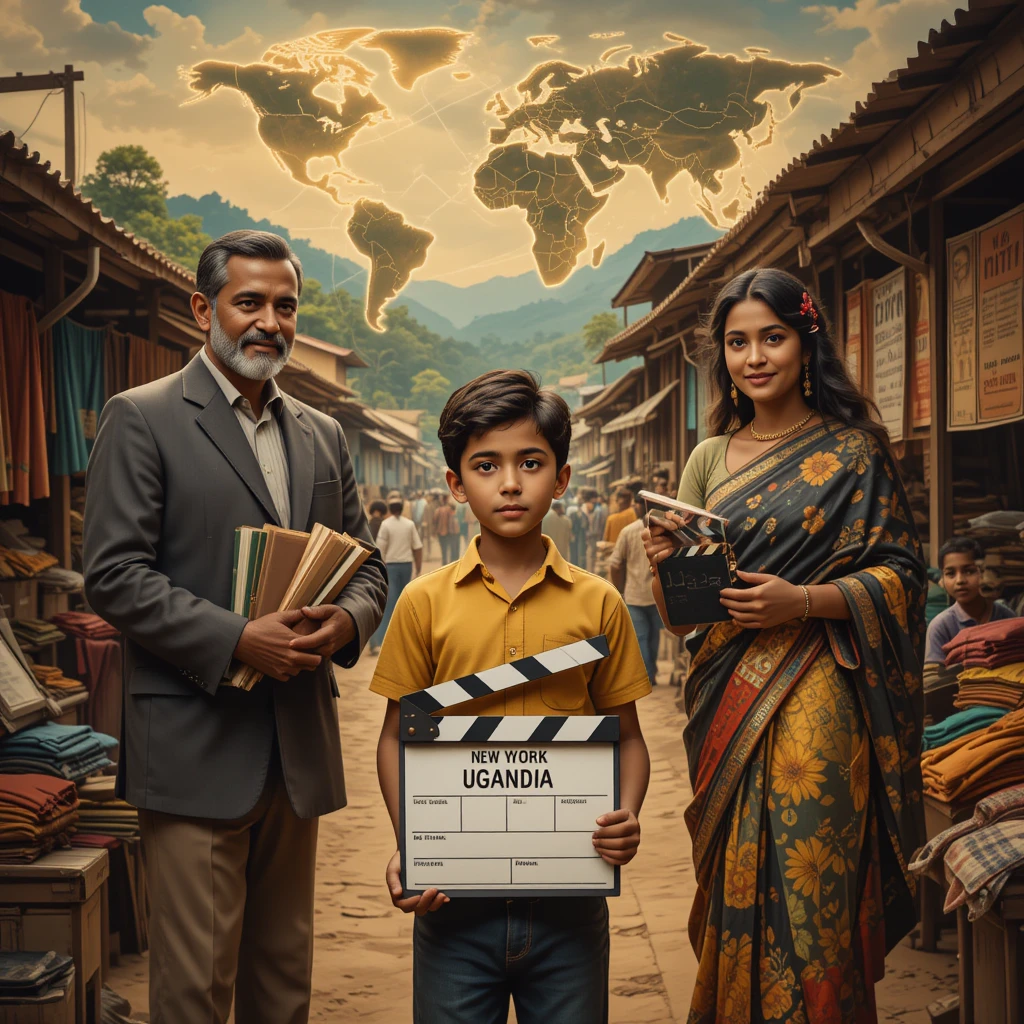
Mamdani spent his early childhood in Uganda before briefly living in South Africa. At the age of seven, his family relocated to New York City, where he grew up in the diverse borough of Queens. This global journey—from East Africa to North America—instilled in him a deep appreciation for multiculturalism and an acute awareness of systemic inequalities, themes that would later define his political career. Mamdani became a naturalized U.S. citizen in 2018, a milestone that underscored his commitment to his adopted homeland.
Family Origins: Mahmood Mamdani and Mira Nair
Mahmood Mamdani, Zohran’s father, was born in 1946 in Bombay (now Mumbai), India, to a Gujarati Shia Muslim family. His family migrated to Uganda during the British colonial era, part of the Indian diaspora that played a significant role in East Africa’s economy. Mahmood grew up in Kampala but faced upheaval in 1972 when Ugandan dictator Idi Amin expelled Asians from the country. This forced displacement shaped his scholarly focus on colonialism, postcolonialism, and power dynamics. Educated at the University of Pittsburgh and Harvard University, where he earned his Ph.D., Mahmood became a leading intellectual, serving as a professor at Columbia University and director of the Makerere Institute of Social Research in Uganda. His books, such as Citizen and Subject and When Victims Become Killers, are seminal works in postcolonial studies, examining the legacies of colonialism and state violence.
Mira Nair, Zohran’s mother, was born in 1957 in Rourkela, Odisha, India, to a Punjabi Hindu family. Raised in a middle-class household, she developed an early passion for storytelling and theater. After studying at Delhi University, she moved to the United States to attend Harvard University, where she met Mahmood Mamdani. Nair’s filmmaking career spans nearly five decades, with critically acclaimed films like Salaam Bombay!, Mississippi Masala, Monsoon Wedding, and The Namesake. Her work often explores themes of identity, migration, and cultural hybridity, reflecting her own diasporic experiences. Nair’s influence on Zohran extended beyond her professional achievements; she credits him with shaping her creative decisions, such as choosing to direct The Namesake over a Harry Potter film when he was 14, highlighting his early intellectual influence.
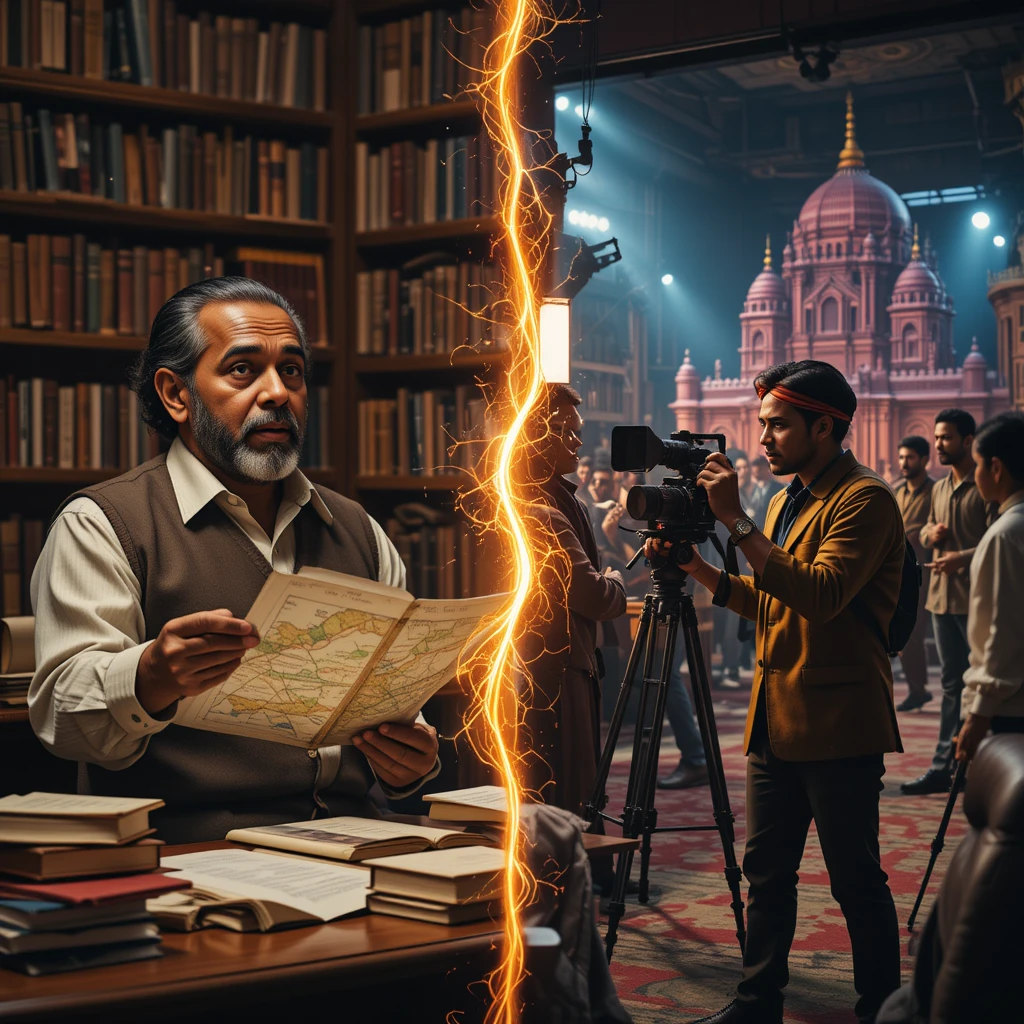
Mahmood and Mira married in 1991, the year Zohran was born. Their partnership blended academic rigor with artistic vision, creating a home environment steeped in political discourse, cultural exploration, and social justice. Zohran, likely their only child (no siblings are mentioned in available records), grew up surrounded by stories of resistance and resilience, from his father’s analyses of colonial oppression to his mother’s cinematic portrayals of marginalized voices.
Cultural and Religious Identity
Zohran Mamdani identifies as a practicing Muslim, reflecting his father’s Gujarati Shia heritage, though his upbringing was shaped by both his father’s Islam and his mother’s Hindu background. This interfaith household fostered a pluralistic worldview, evident in Mamdani’s ability to connect with diverse communities. His campaigns have embraced his South Asian and Muslim identities, using Hindi and Urdu in advertisements to reach immigrant voters and openly discussing his faith to challenge Islamophobia. Mamdani’s marriage to Rama Duwaji, a 27-year-old Syrian artist he met on Hinge, further enriches his multicultural narrative. Their 2025 wedding, a civil ceremony at New York’s City Clerk’s office, symbolizes a modern, inclusive approach to personal and political life.
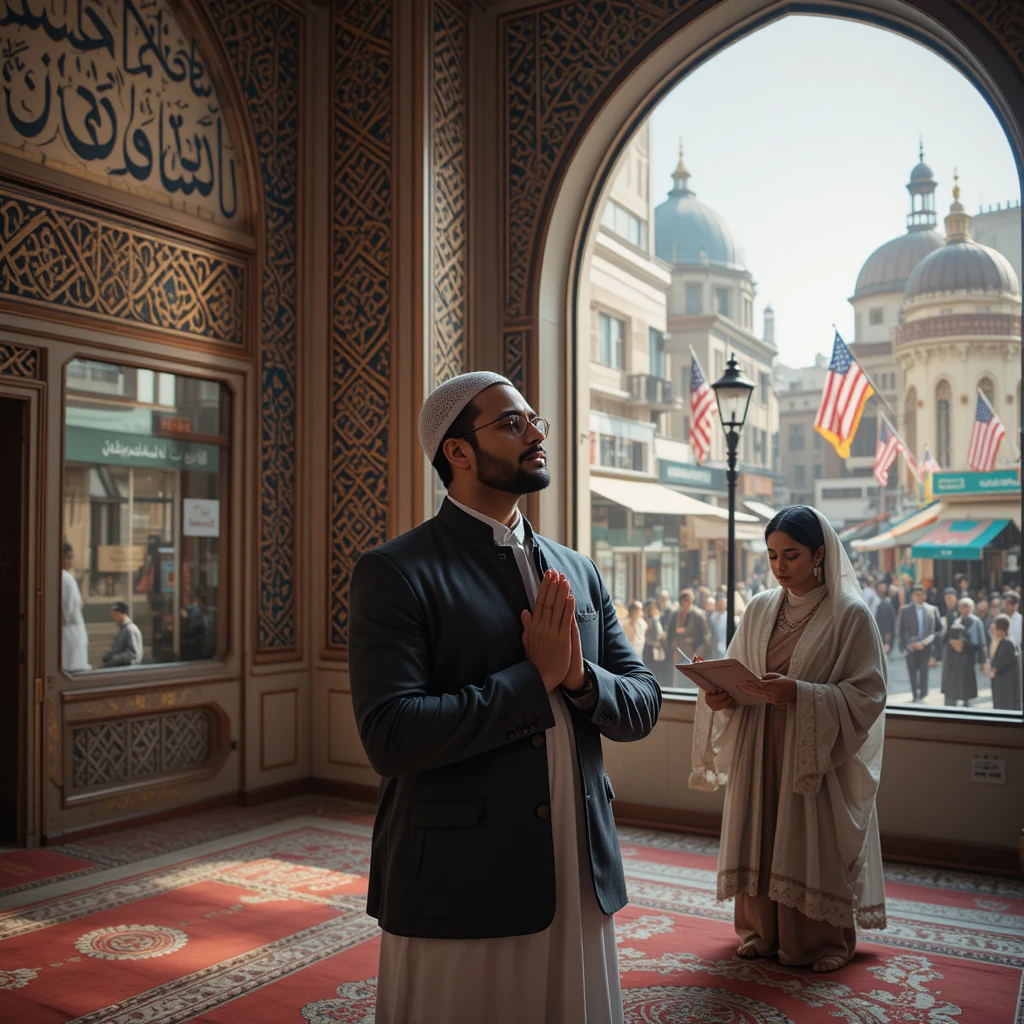
Education and Early Activism
Mamdani’s academic journey began at the Bronx High School of Science, one of New York City’s most prestigious public schools, where he honed his analytical skills. He later attended Bowdoin College in Maine, graduating in 2014 with a degree in Africana Studies and a minor in Economics. At Bowdoin, Mamdani co-founded the college’s first Students for Justice in Palestine (SJP) chapter, marking his entry into political activism. His studies in Africana Studies exposed him to histories of colonialism, slavery, and resistance, while his economics coursework provided a framework for understanding systemic inequality. These academic pursuits laid the groundwork for his later focus on housing justice, economic equity, and global solidarity.
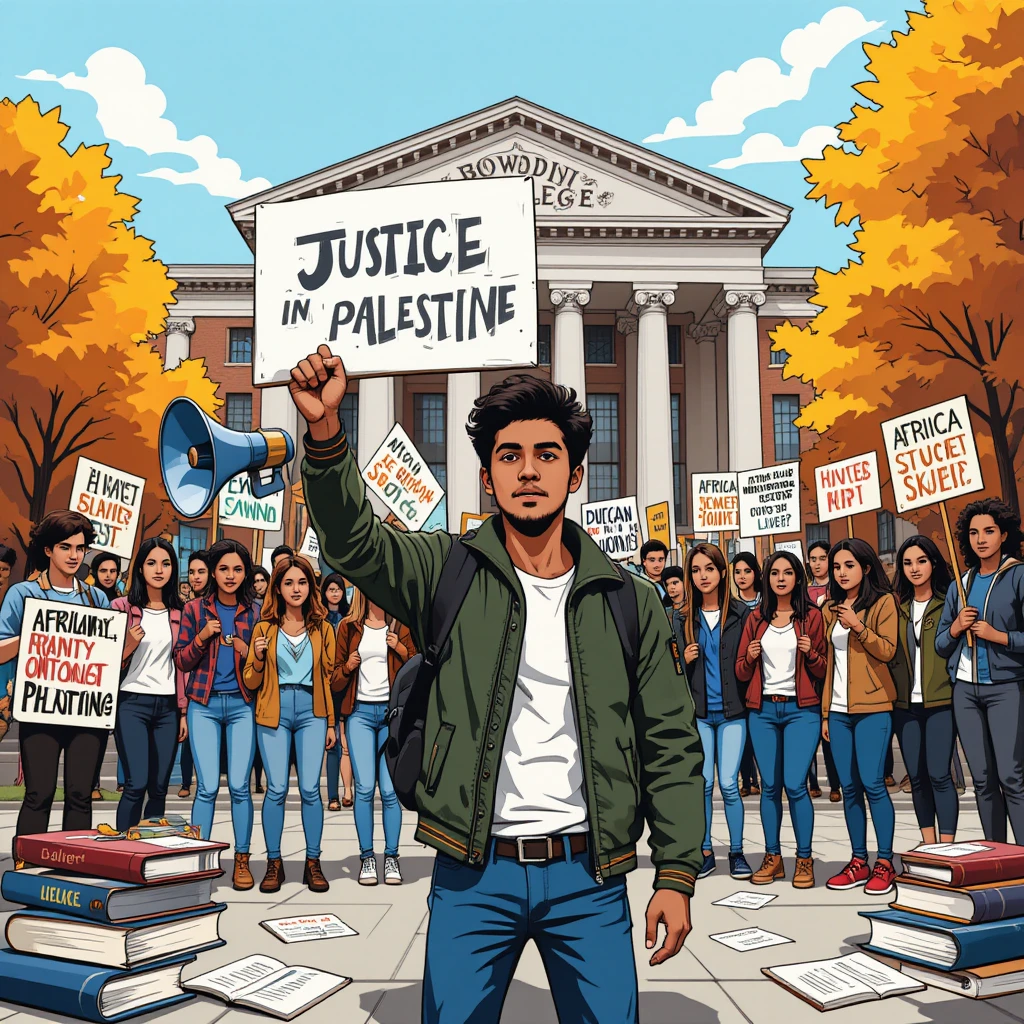
After college, Mamdani worked as a foreclosure prevention housing counselor in Queens, assisting low-income homeowners facing eviction. This role was pivotal, exposing him to the human toll of New York’s housing crisis and solidifying his commitment to tenant rights. He also explored creative outlets, dabbling in hip-hop music, writing, and film, including serving as a music supervisor for his mother’s film Queen of Katwe. However, his passion for organizing and advocacy ultimately drew him to politics.
Political Career
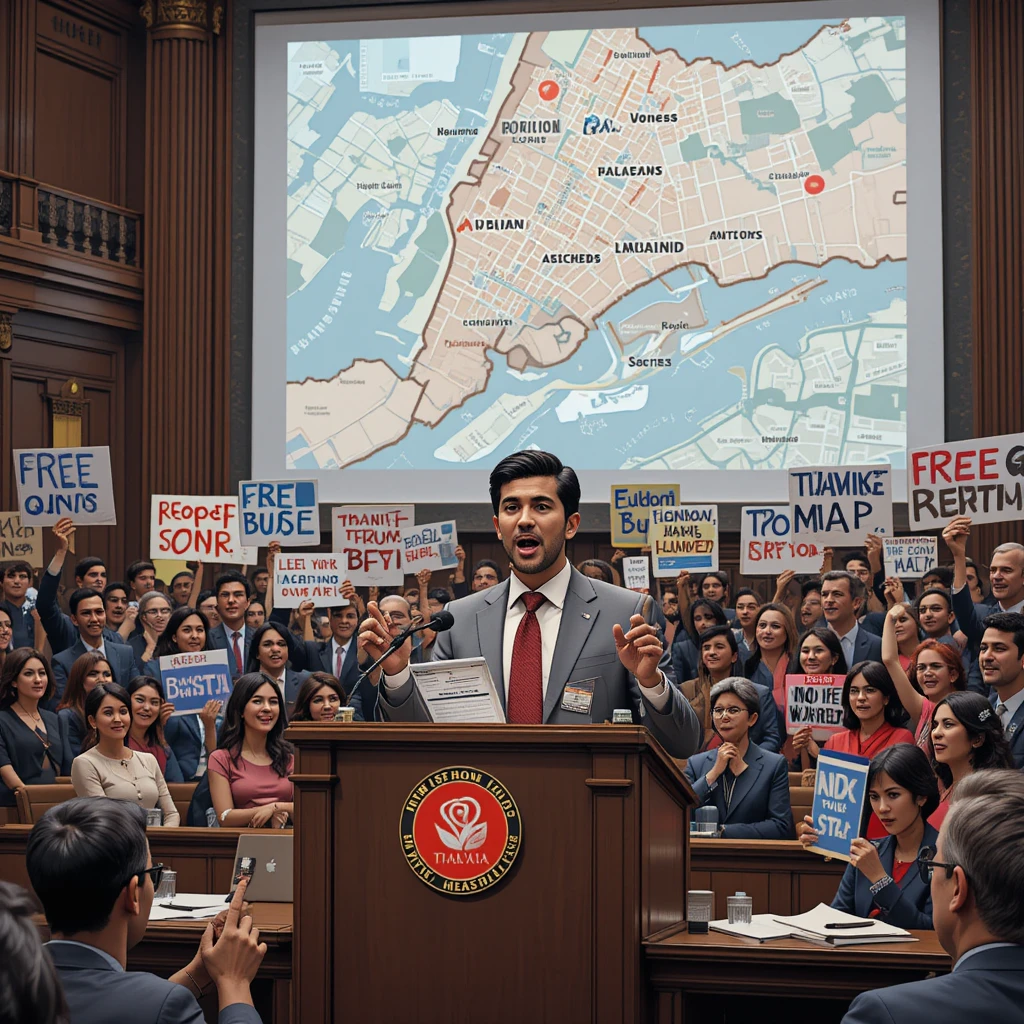
New York State Assembly (2021–Present)
As an assemblyman, Mamdani has prioritized progressive legislation, though his record shows mixed success. He introduced over 20 bills, but only three have become law, reflecting Albany’s slow legislative process and his status as a junior lawmaker. Notable efforts include a 15-day hunger strike in 2021 to secure $450 million in debt relief for taxi drivers and advocating for a fare-free bus pilot program, which he later allowed to lapse to protest the state budget. His work on housing includes pushing for universal rent control and protections for undocumented tenants, though critics argue his proposals lack practical detail. Mamdani’s coalition-building, including with conservative groups like the Manhattan Institute, demonstrates his pragmatic side, but his ideological purity sometimes limits his legislative impact.
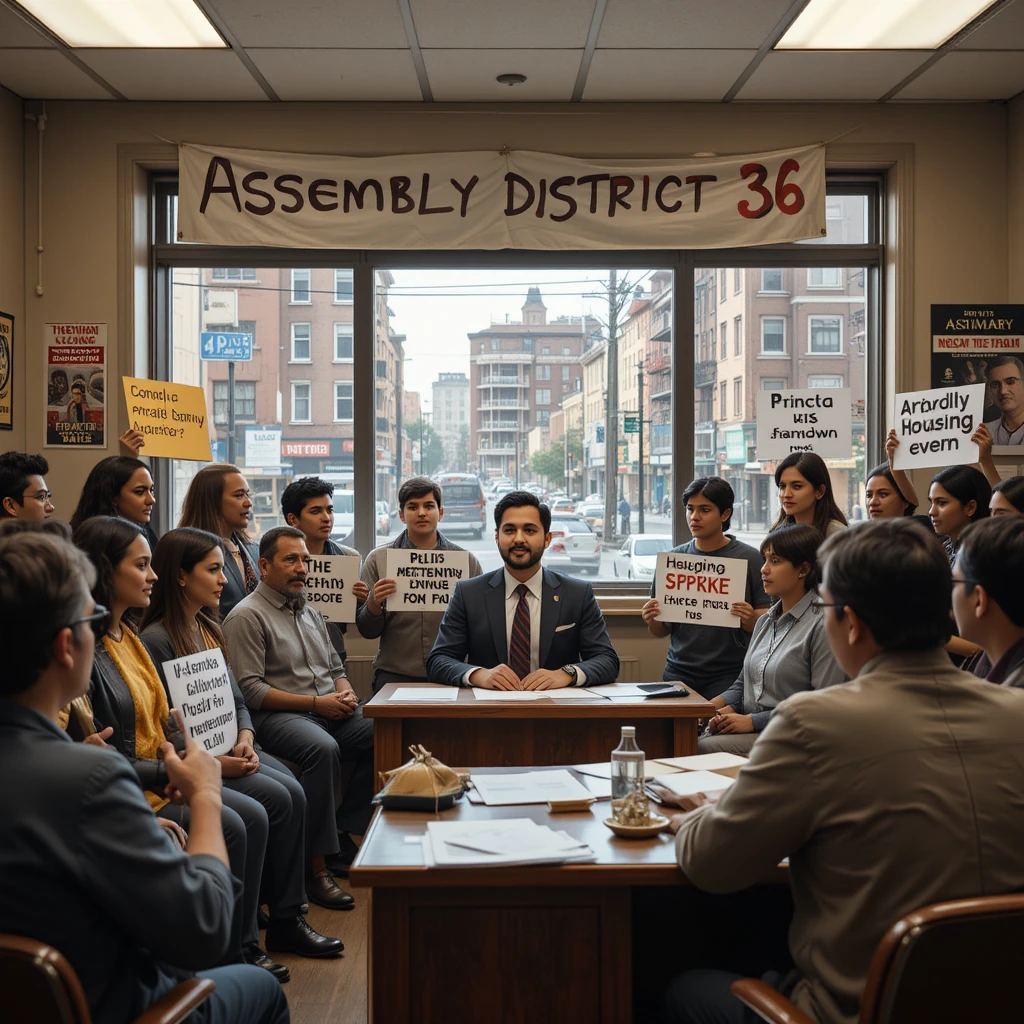
2025 New York City Mayoral Campaign
In March 2024, Mamdani announced his candidacy for New York City mayor, entering a crowded Democratic primary dominated by Andrew Cuomo. Initially polling at 1%, his campaign gained traction through relentless grassroots organizing, viral social media content, and endorsements from progressive heavyweights like Bernie Sanders, Alexandria Ocasio-Cortez, and Comptroller Brad Lander. Mamdani’s platform centered on affordability, promising free buses, rent freezes, city-owned grocery stores, free childcare for children under six, and 200,000 units of publicly subsidized housing. He proposed funding these through higher taxes on the wealthy, a stance that drew both praise and skepticism.
Mamdani’s campaign was a masterclass in modern political strategy. His team leveraged TikTok and Instagram to reach young voters, producing videos that blended policy explainers with cultural references (e.g., rapping about rent control). Fan accounts like “Hot Girls for Zohran” and “Hot Boys for Zohran” amplified his appeal, while his fluency in Hindi and Urdu connected with South Asian communities. A strategic cross-endorsement with Brad Lander maximized their ranked-choice voting advantage, consolidating progressive support. Mamdani’s debate performance, where he sharply rebuked Cuomo’s record on Medicaid cuts and sexual harassment allegations, went viral, cementing his frontrunner status.
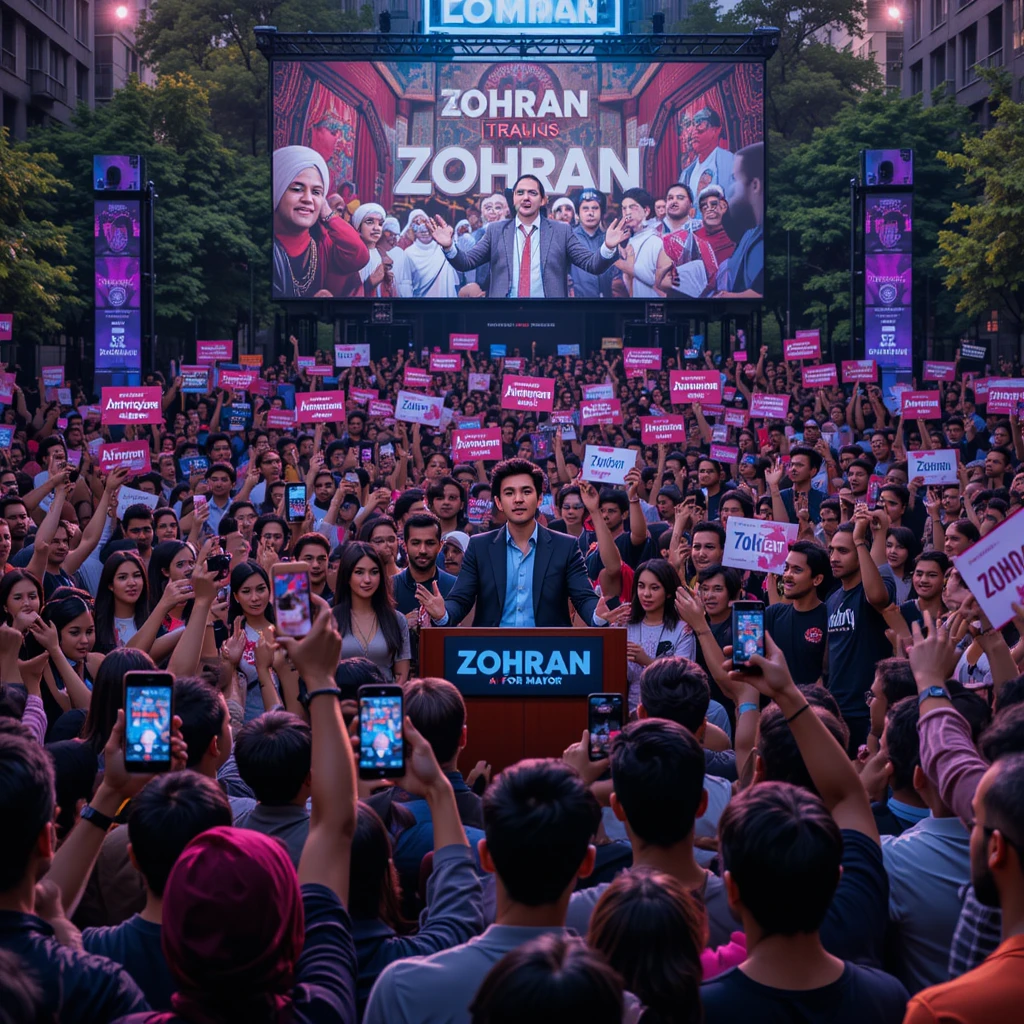
On June 24, 2025, Mamdani won the Democratic primary, a stunning upset over Cuomo, who conceded after trailing in ranked-choice tallies. His victory in diverse neighborhoods, including conservative-leaning areas like Bay Ridge and Bensonhurst, showcased his broad appeal. Mamdani’s $8 million campaign, fueled by 200,000 small donors and 20,000 volunteers, proved that grassroots momentum could outmatch establishment money, despite a $24 million super PAC backing Cuomo.
Ideology and Policy Positions
Mamdani identifies as a democratic socialist, aligning with the likes of Bernie Sanders and Alexandria Ocasio-Cortez. His ideology prioritizes systemic change to address economic, racial, and social inequities, with a focus on working-class and marginalized communities. Below are key aspects of his platform:
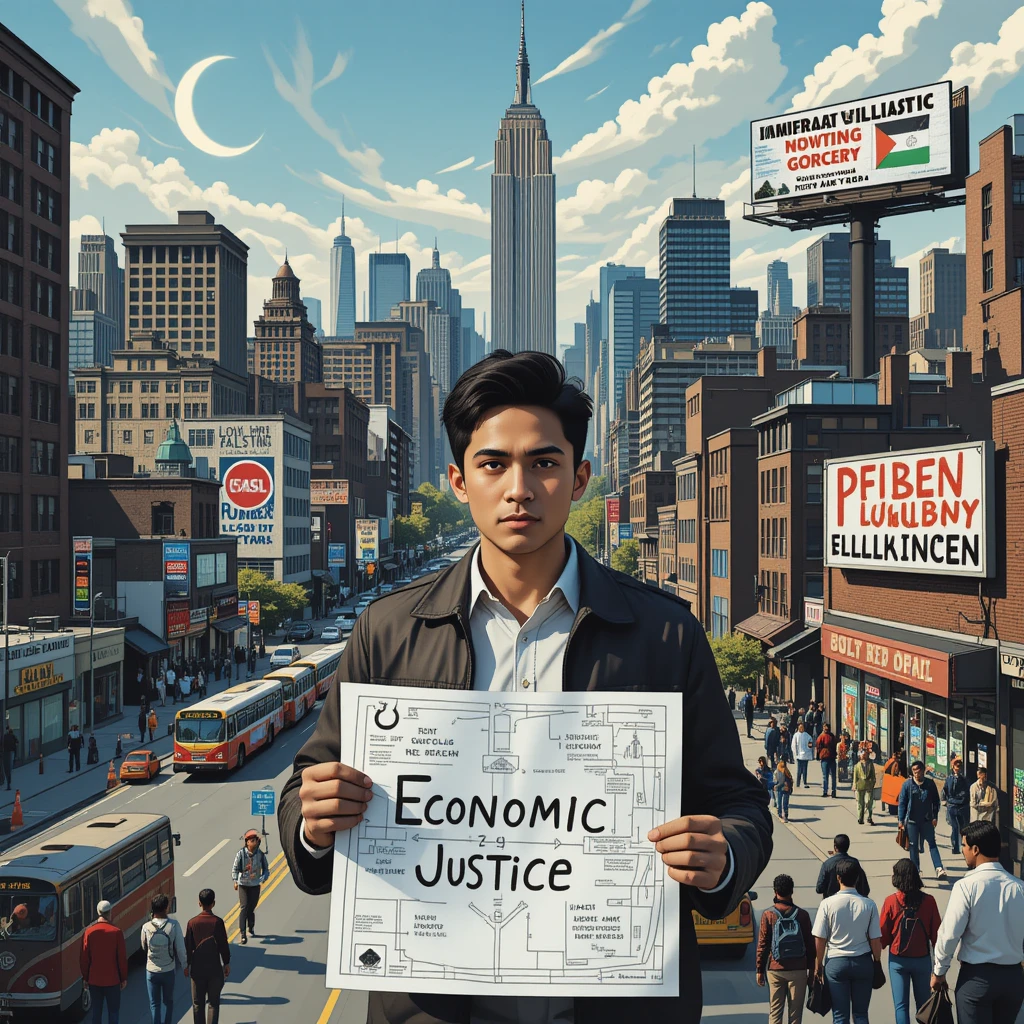
Economic Justice
Mamdani’s core message is affordability in one of the world’s most expensive cities. He advocates for:
- Free Public Transit: A fare-free bus system to reduce commuting costs, requiring state approval from Governor Kathy Hochul.
- Rent Control and Housing: Freezing rents on stabilized apartments and building 200,000 units of public housing, funded by taxing the wealthy.
- City-Owned Grocery Stores: To combat food insecurity and high prices in underserved areas.
- Free Childcare: For children under six, to ease financial burdens on families.
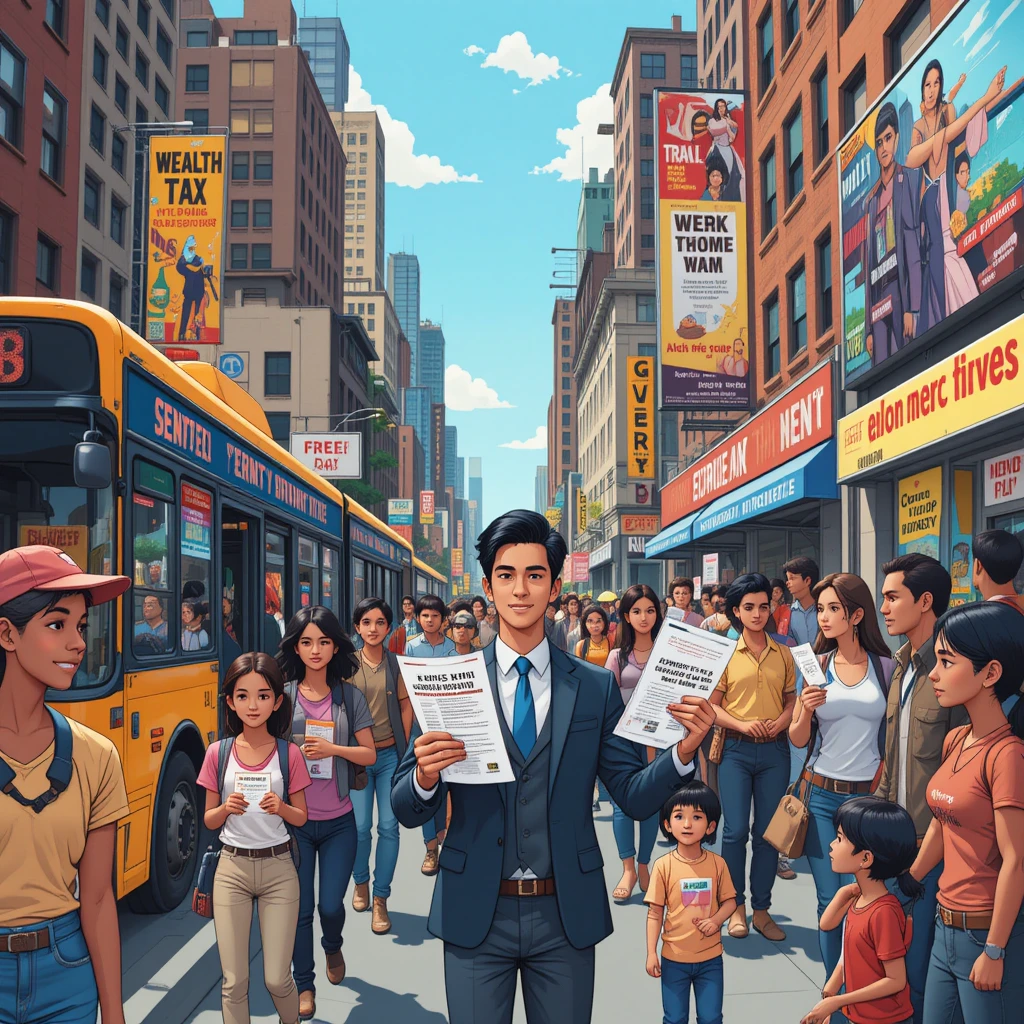
Critics argue his proposals lack cost estimates and rely on politically contentious tax hikes, while supporters praise their ambition to redefine public goods.
Housing and Tenant Rights
Drawing from his experience as a housing counselor, Mamdani champions universal rent control, eviction protections, and tenant organizing. His plan to triple housing funds aims to address New York’s affordability crisis, though some analysts question its feasibility given historical budget constraints.
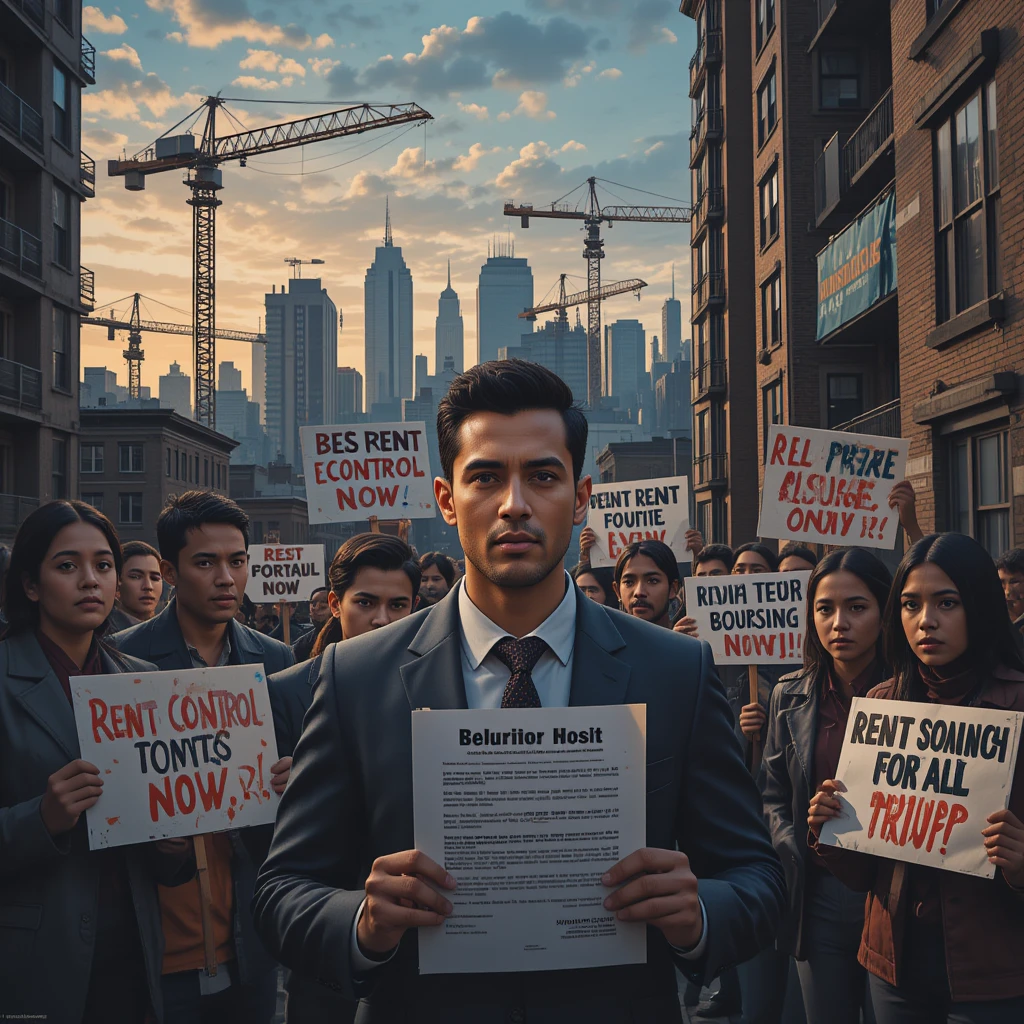
Social Justice and Immigrant Rights
As an immigrant and Muslim, Mamdani advocates for undocumented New Yorkers’ access to services and protections. His campaigns emphasize inclusivity, using his identity to challenge xenophobia and build coalitions across racial and ethnic lines.
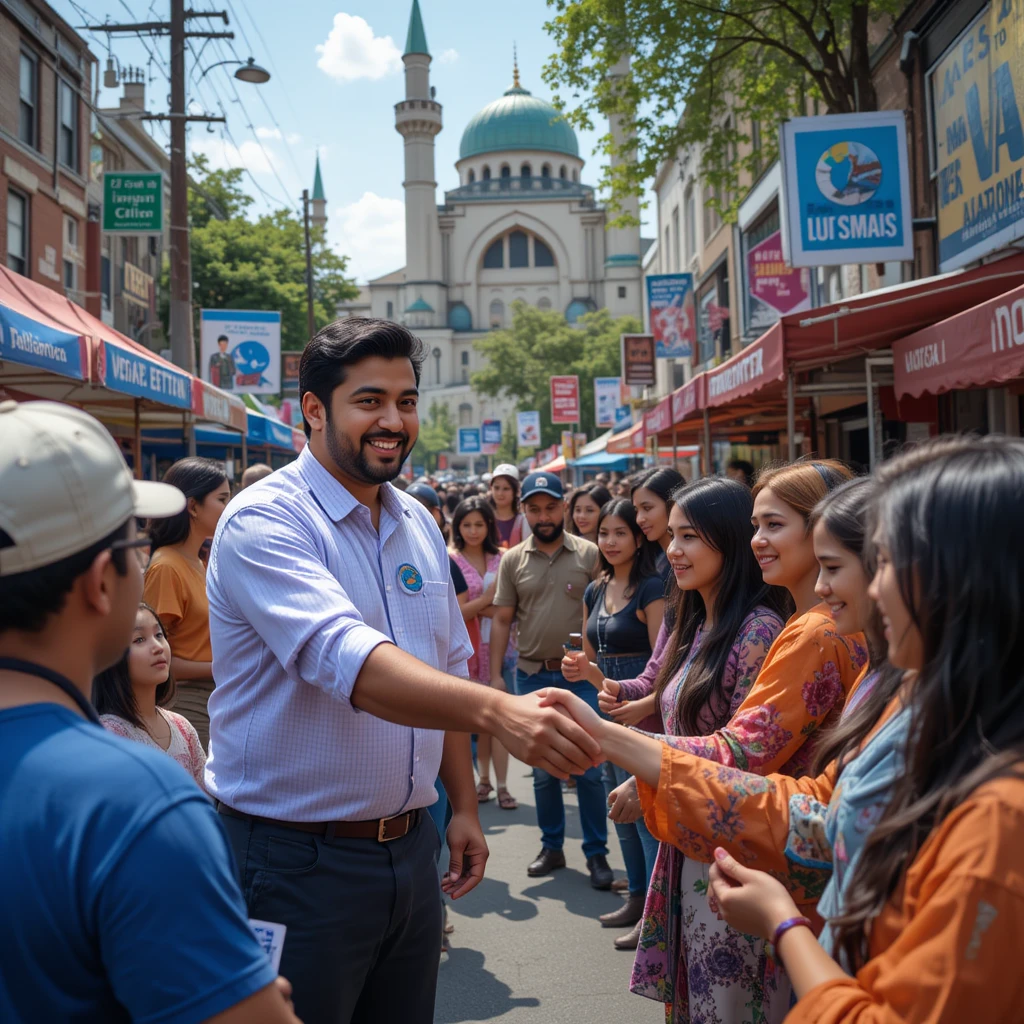
Foreign Policy and Israel-Palestine
Mamdani’s most controversial positions concern Israel-Palestine. He has called Israel’s actions in Gaza “genocide” and labeled it an “apartheid state,” introducing a bill to end tax-exempt status for New York charities tied to Israeli settlements. He declined to support a 2025 Assembly resolution celebrating Israel’s founding, citing its wording, and has attended rallies with groups like Within Our Lifetime. While he acknowledges Israel’s right to exist with equal rights for all citizens, critics, including Rep. Elise Stefanik, accuse him of antisemitism, claims he denies, emphasizing his opposition to all forms of bigotry. These stances have polarized voters, galvanizing progressives but alienating moderates.
Public Safety
Mamdani’s association with “defund the police” rhetoric, rooted in his DSA ties, has drawn scrutiny, though his mayoral campaign focused more on economic issues. He advocates for community-based safety solutions, but critics argue he lacks a clear policing strategy.
Grassroots Organizing
Mamdani’s campaigns are driven by volunteers, small donors, and social media, reflecting a modern, decentralized approach. His ability to frame democratic socialism as universal—addressing universal needs like housing and transit—has broadened his appeal beyond traditional leftist bases.
Future in U.S. Politics
The 2025 Mayoral Election
As the Democratic nominee, Mamdani is favored to win the November 2025 general election, given New York City’s Democratic lean. If elected, he would oversee a $115 billion budget and 300,000 employees, managing critical services like policing, sanitation, and transit. Success could position him as a national model for progressive governance, proving democratic socialism’s viability in a major city. However, challenges include:
- Governing Hurdles: Mamdani must persuade Governor Hochul for state approvals on key policies like free buses and tax hikes. Her moderate stance and rejection of his tax proposals signal resistance.
- Balancing Ideology and Pragmatism: Delivering on ambitious promises requires navigating a fractious city council and business interests, a test of his coalition-building skills.
- Public Safety and Crime: New Yorkers’ concerns about crime could pressure Mamdani to clarify his stance on policing, an area where his platform remains vague.
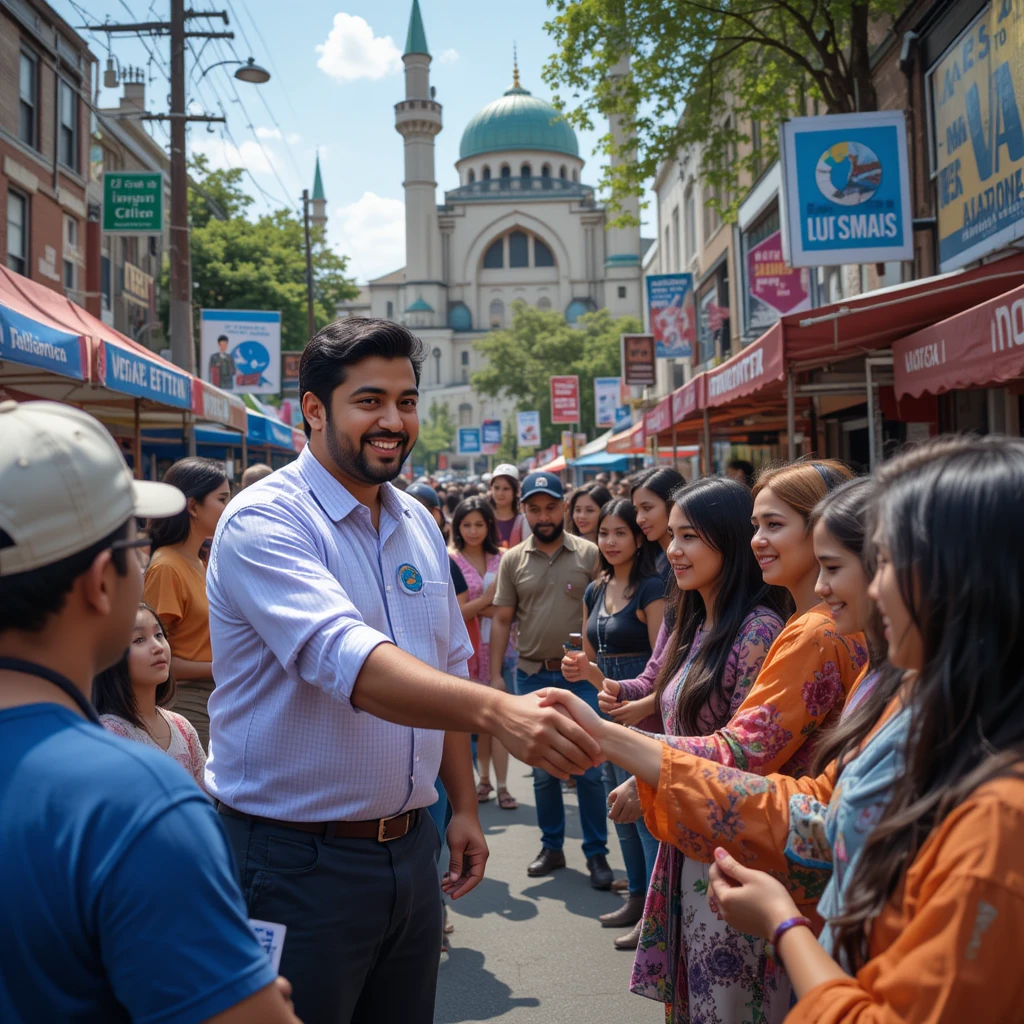
Failure to deliver tangible results could mirror challenges faced by other progressive mayors, like Chicago’s Brandon Johnson, stalling his momentum. Conversely, effective governance could elevate him as a progressive standard-bearer.
National Implications
Mamdani’s victory has sparked debate about the Democratic Party’s direction after its 2024 election losses. His focus on affordability offers a blueprint for Democrats struggling to reconnect with working-class voters. However, his socialist label and Israel-Palestine stance risk alienating centrists, with Republicans already framing him as a radical. Political strategist David Axelrod notes that Mamdani’s economic messaging could inspire national Democrats, but his polarizing views may limit broader appeal.
Potential for Higher Office
At 33, Mamdani has decades to build a national career. His charisma, fundraising prowess ($8 million from small donors), and ability to mobilize young and diverse voters suggest potential for roles like Congress, Senate, or even governor. Comparisons to Barack Obama highlight his coalition-building skills, but his limited governing experience and controversial foreign policy views could hinder ambitions beyond New York. His success in managing the city’s complex bureaucracy will be critical to establishing credibility for higher office.
Leadership in the Progressive Movement
Mamdani’s ties to the DSA and endorsements from Sanders and Ocasio-Cortez position him as a leader in the democratic socialist movement. His ability to win in conservative-leaning neighborhoods demonstrates a rare ability to bridge ideological divides, a skill that could shape progressive strategies nationally. However, he must balance ideological purity with pragmatic governance to sustain his influence.
Challenges and Criticisms
Governing Inexperience
Critics highlight Mamdani’s thin legislative record (three bills passed) and lack of executive experience, arguing he is unprepared to manage a city of 8.5 million. His ambitious proposals, like tripling housing funds, face scrutiny for cost and feasibility, with some analysts questioning his grasp of municipal finance.
Polarizing Positions
Mamdani’s Israel-Palestine stance and DSA affiliation invite accusations of extremism. Posts on X have labeled him “Hinduphobic” and “anti-Semitic,” reflecting the intensity of opposition from some quarters. While these claims lack substantive evidence and may reflect political bias, they underscore the challenges of navigating a polarized electorate.
Islamophobia and Racism
As a Muslim and South Asian candidate, Mamdani has faced daily Islamophobic threats, including messages calling for violence. His campaign’s emphasis on his identity, while galvanizing supporters, has attracted racially motivated attacks, requiring police intervention. These challenges highlight the personal risks of his public role.
Party Tensions
Mamdani’s rise exacerbates tensions between the Democratic Party’s progressive and centrist wings. Establishment Democrats may resist his leadership, fearing his policies alienate moderate voters, while progressives see him as a path forward. Navigating these divides will test his political acumen.
Conclusion
Zohran Kwame Mamdani’s journey from a Ugandan-born child of Indian intellectuals to the Democratic nominee for New York City mayor is a testament to his resilience, vision, and political talent. Rooted in a family of scholars and artists, his multicultural upbringing shaped a worldview that blends empathy with systemic critique. As a democratic socialist, Mamdani champions bold solutions to address New York’s affordability crisis, drawing on his experience as a housing counselor and organizer. His 2025 primary victory, driven by grassroots momentum and modern campaigning, marks a turning point for progressive politics.
If elected mayor, Mamdani has the opportunity to redefine urban governance, but he faces formidable challenges, from governing inexperience to ideological polarization. His future in U.S. politics hinges on his ability to translate campaign promises into tangible results, bridging divides within his party and city. At 33, Mamdani represents a new generation of leaders, one that embraces diversity, confronts inequality, and dares to imagine a more equitable future. Whether he becomes a national figure or a cautionary tale, Zohran Mamdani’s story is already reshaping the American political landscape.
References
- NPR. (2025, June 25). 4 things to know about Zohran Mamdani, presumptive Democratic nominee for NYC mayor. Retrieved from www.npr.org
- BBC. (2025, June 25). Who is Zohran Mamdani?. Retrieved from www.bbc.com
- The Guardian. (2025, June 25). Zohran Mamdani offered New Yorkers a political revolution – and won. Retrieved from www.theguardian.com
- The Washington Post. (2025, June 25). Who is Zohran Mamdani, candidate for mayor in New York City?. Retrieved from www.washingtonpost.com
- POLITICO. (2025, June 26). Mamdani’s victory would signal seismic shift in national politics and test for socialist movement. Retrieved from www.politico.com
- The Guardian. (2025, June 25). Free buses, more housing, taxing the rich: how Zohran Mamdani has gone viral in the New York mayor’s race. Retrieved from www.theguardian.com
- The Guardian. (2025, June 25). ‘New Yorkers have been betrayed’: can Zohran Mamdani become the most progressive mayor in the city’s history?. Retrieved from www.theguardian.com
- Al Jazeera. (2025, June 22). Zohran Mamdani’s mayoral bid is bigger than New York. Retrieved from www.aljazeera.com
- The New York Times. (2025, June 26). As N.Y.C. Mayoral Primary Nears, Money Talks as Mamdani Walks. Retrieved from www.nytimes.com
- MyNewsGH. (2025, June 26). Zohran Kwame Mamdani Ethnicity, Parents, Siblings, Height, Children. Retrieved from www.mynewsgh.com
- Hindustan Times. (2025, June 26). Indian-origin Zohran Mamdani, son of filmmaker Mira Nair, stuns in NYC mayoral primary race. Retrieved from www.hindustantimes.com
- Times of India. (2025, June 25). Zohran Mamdani ethnicity: Indian-origin, Ugandan-soul, NYC grit. Retrieved from timesofindia.indiatimes.com
- Distractify. (2025, June 26). Who Are Zohran Mamdani’s Parents? Meet Mahmood Mamdani and Mira Nair. Retrieved from www.distractify.com
- The Economic Times. (2025, June 25). nyc mayoral race: You won’t believe who Zohran Mamdani’s parents are?. Retrieved from economictimes.indiatimes.com
- Indian Express. (2025, June 25). NYC Mayoral Elections Results 2025: Meet Zohran Mamdani. Retrieved from indianexpress.com
- Variety. (2025, June 26). Zohran Mamdani Told Mom Mira Nair to Turn Down ‘Harry Potter’. Retrieved from variety.com
- Blavity. (2025, June 25). Zohran Mamdani’s Mother Is ‘Mississippi Masala’ Director Mira Nair. Retrieved from blavity.com

